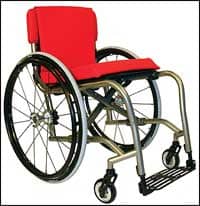 |
| Lightweight wheelchairs are generally used by those who lead more active lifestyles. |
Why provide a manual wheelchair when a power chair is so much easier? This question came to me after I received a call for help from a home health therapist. The therapist had a new referral—a past customer of mine who was recently discharged from the hospital with a brand-new power wheelchair.
Since her spinal cord injury several years ago, I had sold the patient two ultra-lightweight wheelchairs with a custom seating system. Besides her diagnosis of paraplegia, she also has a hemi-pelvectomy on the left and a recent amputation on the right with severe lordosis and scoliosis. It was surprising this person received a power wheelchair considering her good upper extremity function. But even more surprising, the power chair had only a basic captain’s seat.
The problem—identified by the home health therapist—was that the new power chair was useless. Her new patient could not use her new chair with the captain’s seat because she could not sit up in it. Yet, it was delivered to her in a facility with prescribing practitioners looking out for her best interests. I am uncertain where the breakdown started in obtaining the most appropriate equipment for this client, but I do know it is now difficult or impossible to correct.
My advice to the home health therapist was to have the client contact the supplier immediately to make him aware of the issue. I further advised the therapist to contact the rehabilitation facility to determine how something more appropriate could be provided. If neither of these approaches worked, then the customer and the therapist should report the situation to the Medicare fraud unit.
The client should never have accepted a product that did not meet her needs, especially because she was an experienced wheelchair user and should have known better. Even so, if, after trying the new chair, she found it impossible to use, she should have immediately contacted the supplier and insisted they take it back and make it right. But like many people dealing with multiple challenges, she waited until she had her first appointment with the home health therapist before making the problems known.
Some suppliers (those without credentials) deliver only the easy products—basic mobility devices—with little regard to actual needs. Is this because the supplier lacks knowledge of seating and positioning, or does not understand product mix? Do these suppliers realize the harm and/or serious issues caused by delivering and billing for a product that does not meet the consumer’s needs? The other side of the coin is that too many consumers accept these products with few or no complaints, and then wonder why they can not get the right equipment a few weeks later when they show up at the clinic.
It almost seems as if Medicare’s new regulations make it easier for consumers to receive power wheelchairs instead of ultra-lightweight manual wheelchairs. Because of the additional documentation requirements and somewhat vague policy language, many suppliers believe that supplying an ultralight manual chair is riskier than supplying a power chair. People who make full use of an ultralight are generally active users who perform activities of daily living inside and outside the home. Medicare’s new coverage criteria that focus only on mobility related activity of daily living (MRADL) skills inside the home are shortsighted and not based on the way people live. Therefore, trying to justify a K5 can be quite a challenge if only MRADLs are considered. This, along with the additional expertise required to measure, adjust, and properly fit a person with an ultra-lightweight wheelchair, may make some suppliers shy away from them.
Is it easier to get a $5,000 power wheelchair covered than a $2,000 ultralight? Take the example of a custom ultra-lightweight wheelchair with a highly custom-molded seating system. In this case, gathering the necessary medical justification information to accept an assigned claim may be beyond some suppliers’ interest and/or skill. Thus, they may take the easy route and provide a more expensive power chair that is utterly useless. It angers me that Medicare has no mechanism to protect consumers from something like this. Unfortunately, comments from other RTSs across the country confirm that the experience outlined above is not that unusual.
There is a voluntary mechanism to protect consumers through the National Registry of Rehabilitation Technology Suppliers (NRRTS). As a registrant of NRRTS, I can be held accountable for my actions through a complaint resolution procedure. A registrant can lose their registration privileges if found in violation of the NRRTS Standards of Practice or Code of Ethics (www.nrrts.org). Unfortunately, this registration or any other similar certification program is not required for Medicare suppliers. A few states realize the importance of certification and have enacted policy or legislation to require registration or certification, but this is rare. Why? Some argue it is a restriction of trade to require registration for people who sell wheelchairs. But there are many practice arenas where certification, registration, or even a license is required to protect the public interest for professions such as barbers, taxi drivers, massage therapists, and plumbers. So why is it not required for those selling wheelchairs and seating systems? Maybe certification cannot prevent all fraud, abuse, or unknowledgeable vendors, but it would be a great starting point.
Michael Seidel, CRTS®, is president of the National Registry of Rehabilitation Technology Suppliers (NRRTS), Lago Vista, Tex.





